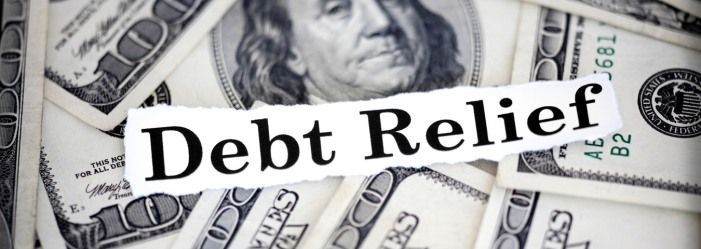Last Updated: November 14, 2023
Is it Good to Take a Debt Relief Program?

Getting into debt is easy. Getting out of debt is far more difficult. If you are in debt and are having trouble paying off your debts, you should consider a debt relief program.
There are four different methods: credit counseling, debt management plans, debt settlement, and bankruptcy. Each one has its downsides and its upsides. Since bankruptcy should be your very last option after you have tried everything else, we are going to discuss the first three.
If you would like more information on bankruptcy, there are a number of blogs on the Pacific Debt, Inc website that go into more detail. But back to debt relief and the question what exactly is it?
What is Debt Relief?
Debt relief is a way to make your debts easier to handle and make it easier for you to pay off your debt. Ideally, you should learn how to manage your finances in order to stay out of debt in the future.
You can do it yourself or find professionals who can help. Most people who are reading this blog have probably realized that they need professional assistance in order to get debt relief.
Compare Debt Relief Options
Before you start on professional debt relief, ask yourself the following questions:
- Am I behind on paying bills and loans?
- Am I struggling to afford payments?
- Have I tried to manage my debt but failed?
- Have I thought about bankruptcy?
- Have I stopped adding to debt balances?
- Am I committed to a long-term debt relief plan?
If you answer yes to all of these, you are a great candidate for debt settlement or debt consolidation.
If you answer yes to all but numbers 1, 2, and 3, you may be a great candidate for credit counseling.
Next, let’s look at how debt relief works.
How Does Debt Relief Work?
Basically, in debt relief, you make a plan to pay off debts and then follow through. Each program is slightly different, but one option you might be offered may be a debt management plan (DMP).
In this plan, you choose which debts to enroll in the DMP. You then make one payment to the program manager a month. It is then split between the debts as agreed by you and the debt relief company.
Now let’s discuss each type of debt relief program, possible debt management plans, and the pros and cons for each one.
Compare Debt Relief Options
Credit Counseling
In credit counseling, you meet with a professional who will help you learn to manage your money by setting up a budget and creating a plan to pay off debt. Ideally, you will learn to stay out of debt in the future.
There are not-for-profit credit counseling agencies that are either free or charge on a sliding scale. Before choosing a credit counselor, make certain that both the agency and the counselor are certified by the National Foundation for Credit Counseling or the Financial Counseling Association of America.
Credit counseling may include a DMP handled by the credit counseling agency. Make sure that your money is put into an escrow or in some way insured against theft by an unreliable credit counselor.
Who is a good candidate for credit counseling?
- You need help creating a workable budget
- You can generally make your payments
- You are not behind on payments
- You want to learn how to better manage your money
Credit Counseling Pros
- You will learn to budget and have a plan to stay out of debt in the future
- Credit counseling should not affect your credit score negatively
Credit Counseling Cons
- You will pay the full amount of each debt
- You may have fees
- This may be a scam - always check accreditation and ratings
Debt Consolidation
In debt consolidation, you take out a loan and repay your debts with that loan. You then pay off the loan. This loan can be an unsecured personal loan, a balance transfer credit card, or a secured loan.
Debt consolidation generally involves a modified DMP. Any bills not included in the debt consolidation may need to be enrolled in a DMP to help you pay them off.
Make sure that your money is put into an escrow or in some way insured against theft by an unreliable debt consolidation agency.
Check out the debt consolidation company at the BBB and look for one that has been in business for more than a few years.
Who is a good candidate for debt consolidation?
- You have a concrete plan to pay off the loan more quickly than it is due (saves on interest and fees)
- You have read and understood the fine print for the loan or credit card
- You have stopped adding to your debt load
- You can find a loan with a lower interest rate than your current debt rates
Debt Consolidation Pros
- You may save on interest, depending on how the loan is structured
- You should improve your credit score fairly quickly
- This is a fairly quick solution to debt
Debt Consolidation Cons
- Using a loan secured by your home (a home equity loan or cash-out refinance) can but your home at risk of foreclosure if you can not make your payments
- Balance transfer credit cards can have high transfer fees and missed payment penalties
- Balance transfer credit cards can have high post-introductory interest rates
- Debt consolidation interest rates are dependant on your credit score
- You pay the full amount due
- There may be fees
- This may be a scam - always check accreditation and ratings
Debt Settlement
In debt settlement, you or a debt settlement professional negotiates with each debtor to decrease the amount of the debt owed to each creditor, making it easier to pay off.
If you are working with a debt settlement company, you make monthly payments to the company. As you build up your deposits, the agency then uses them to pay off each debt.
Debt settlement may involve a modified DMP. Any non-negotiable bills may be enrolled in a DMP to help you pay them off.
Check out the debt settlement company at the BBB and look for one that has been in business for more than a few years, such as Pacific Debt, Inc.
Check accreditations as well - you should see accreditations with the American Fair Credit Council (AFCC) and the International Association of Professional Debt Arbitrators (IAPDA).
Who is a Candidate for debt settlement
- You cannot make your monthly payments
- You are behind on your monthly payments
- You have more than $10,000 in unsecured debt (such as credit cards)
Debt Settlement Pros
- You pay less than is owed
- You decrease interest payments
- Debt settlement may include assistance with budgeting and future debt management
Debt Settlement Cons
- Debt settlement may have tax consequences (talk to a CPA before enrolling)
- Debt settlement may temporarily damage your credit score
- There may be fees
- This may be a scam - always check the debt settlement companies accreditation and ratings
- Debt settlement may take 2 to 5 years to complete the program
- Not all debt is negotiable
Learn more by reading
How Long Does Debt Settlement Stay on Your Credit Report?
FAQs
Conclusion
There is a lot to consider before you pick which debt relief program you would like to try. The most important things to consider are the company’s reputation and fees, your personal commitment to debt relief, and making certain that you understand what you are agreeing to.
In other words, do your homework and shop around. You may have a temporary negative impact on your credit score but when you commit to living debt free and within a budget, your credit score will improve quickly and you will feel better about your finances.
Each type of debt relief is geared toward a different situation and personality. By looking at each type of debt relief option, you should be able to find a plan that will help you to get out of debt and learn how to live without running up debts again. It is not easy, but the rewards will be immeasurable.
If you would like to discuss your options with someone, give
Pacific Debt a call. We will go over all your options and since debt settlement is not for everyone, we will refer you to a reputable program that better fits your needs.
Reduce Your Credit Card Debt By Up to Half

BBB Reviews | 4.9/5.0 Rating









 Do Not Sell My Personal Information
Do Not Sell My Personal Information